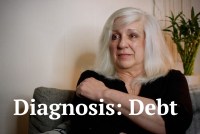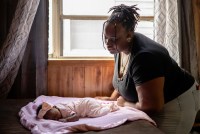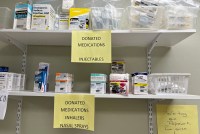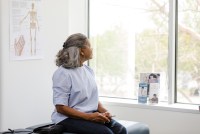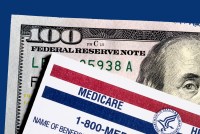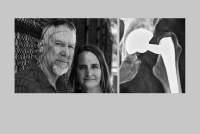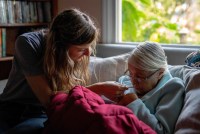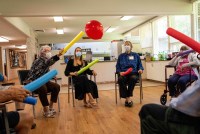Latest Morning Briefing Stories
Republicans Once Championed Public Health. What Happened?
It wasn’t that long ago that Republicans were all-in on boosting public health spending. “The highest investment priority in Washington should be to double the federal budget for scientific research,” former House Speaker Newt Gingrich (R-Ga.) wrote in a 1999 op-ed in The Washington Post. Big spending increases for the National Institutes of Health soon […]
Millions in Opioid Settlement Funds Sit Untouched as Overdose Deaths Rise
Some states haven’t begun using opioid settlement funds intended to help curb the opioid epidemic. Meanwhile, more than 100,000 Americans died of an overdose last year.
Listen: What Our 2-Year-Long Investigation Into Medical Debt Reveals
An award-winning project by KFF Health News and NPR found that at least 100 million people in the United States are saddled with medical bills they cannot pay — and exposed a health care system that systematically pushes people into debt.
Watch: She Had a Home and a Good-Paying Job. Then Illness and Debt Upended It All.
A chronic health diagnosis and medical debt reordered Sharon Woodward’s life.
Being Black and Pregnant in the Deep South Can Be a Dangerous Combination
Being Black has always been dangerous for pregnant women and infants in the South. And researchers say things are continuing to move in the wrong direction.
What the Health? From KFF Health News: Democrats See Opportunity in GOP Threats to Repeal Health Law
Sensing that Republicans are walking into a political minefield by threatening once again to repeal the Affordable Care Act, the Biden administration is looking to capitalize by rolling out a series of initiatives aimed at high drug prices and other consequences of “corporate greed in health care.” Meanwhile, the Supreme Court hears a case that could determine when and how much victims of the opioid crisis can collect from Purdue Pharma, the drug company that lied about how addictive its drug, OxyContin, really was. Alice Miranda Ollstein of Politico, Anna Edney of Bloomberg News, and Rachana Pradhan of KFF Health News join KFF Health News chief Washington correspondent Julie Rovner to discuss these issues and more. Also this week, Rovner interviews Dan Weissmann of KFF Health News’ sister podcast, “An Arm and a Leg,” about his investigation into hospitals suing their patients over unpaid bills.
Colorado culpa a Biden y a farmacéuticas por retrasar importaciones de medicamentos de Canadá
Los consumidores estadounidenses pagan algunos de los precios más altos del mundo por medicamentos de marca. En Canadá, el gobierno controla los precios.
Programas ponen los medicamentos sin usar en manos de pacientes que los necesitan
Recogen de centros de salud, residentes, farmacias o prisiones los medicamentos sin abrir y sin caducar que se acumulan cuando los pacientes son dados de alta, cambian de medicina o mueren, y los redistribuyen a pacientes vulnerables.
Encuesta revela que persiste la discriminación racial en la atención médica
Casi la mitad de los pacientes hispanos, los Indio americanos y los nativos de Alaska sienten que no se los respeta.
Dodging the Medicare Enrollment Deadline Can Be Costly
As open enrollment ends, many people are tuning out. They could wind up with a surprise next year: higher costs and less access to health care providers.
Colorado Blames Biden Team and Drugmakers for Delaying Canadian Imports
Colorado officials say they haven’t been able to stand up a program to import drugs from Canada because of drugmaker opposition — and the Biden administration’s inaction.
Readers Slam Hospital Monopolies and Blame the Feds for Understaffed Nursing Homes
KFF Health News gives readers a chance to comment on a recent batch of stories.
These Programs Put Unused Prescription Drugs in the Hands of Patients in Need
States and counties look to expand programs that accept donations of unused surplus drugs from places like nursing homes and hospitals and redistribute them to low-income and uninsured residents.
Colorado Says Drug Industry Blocked Its Canada Dreams – And Biden Hasn’t Helped
Colorado’s leaders had grand plans to import cheaper medicines from Canada, after the Trump administration issued rules in 2020 allowing states to try it. But officials in Denver say they’ve been stymied by opposition from drugmakers — as well as the Biden administration’s inaction on the policy. That’s according to a Dec. 1 report we […]
Patients Expected Profemur Artificial Hips to Last. Then They Snapped in Half.
The FDA and the manufacturer were alerted to Profemur titanium hips breaking inside U.S. patients as of 2005. It took 15 years to recall the devices. Many fractures could have been avoided.
Many People of Color Worry Good Health Care Is Tied to Their Appearance
Many people from racial and ethnic minority groups brace themselves for insults and judgments before medical appointments, according to a new survey of patients that reaffirms the prevalence of racial discrimination in the U.S. health system.
California’s Ambitious Medicaid Experiment Gets Tripped Up in Implementation
The health care insurers, nonprofit organizations, and other groups responsible for implementing Gov. Gavin Newsom’s ambitious plan to infuse Medicaid with social services say their ability to serve vulnerable, low-income Californians is hamstrung.
Desperate Families Search for Affordable Home Care
Facing a severe shortage of aides and high costs, people trying to keep aging loved ones at home often cobble together a patchwork of family and friends to help.
What to Know About Home Care Services
Finding an aide to help an older person stay at home safely takes work. Here’s a guide.
What the Health? From KFF Health News: Trump Puts Obamacare Repeal Back on Agenda
Although Republicans have never united behind a replacement for the Affordable Care Act, 2024 GOP presidential front-runner Donald Trump said this week he wants to put the issue back on the national agenda. That delights Democrats, who have won at least two elections partly by defending the now-popular health law. Meanwhile, the Texas Supreme Court takes up a case brought by women who say their pregnancy complications further endangered their health due to the vagueness of Texas’ near-total ban on abortions. Joanne Kenen of Johns Hopkins University and Politico Magazine, Sarah Karlin-Smith of the Pink Sheet, and Victoria Knight of Axios News join KFF Health News chief Washington correspondent Julie Rovner to discuss these issues and more. Also this week, Rovner interviews KFF Health News’ Rachana Pradhan, who reported and wrote the latest “Bill of the Month” feature.






